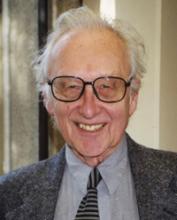Our friend and colleague Otto Reinert died in Seattle on October 19, 2013, 90 years after his birth in Norway. He came to the United States in 1945 for the benefits of higher education after the collapse of the Norwegian university system during the Second World War. An academic scholarship in America was the prize for his service to Norway in the Resistance to Hitler, a gift whose irony he appreciated. Apart from several attempts at repatriation, he was to remain here for the rest of his life, including nearly 35 years in English and Comparative Literature at UW. His field in English was Restoration and 18th century; as a comparatist he concentrated on European drama, Classic Through Modern, to borrow from the title of one of several anthologies that he edited for Little, Brown in the 1960s. A collection of essays on Strindberg and his own fine translation of Ibsen’s Wild Duck suggest that at his center of consciousness he never left home. He remained a citizen of Norway.
I have no doubt that his Norwegian experience followed by what he was sometimes inclined to call his long “exile” (though he shied away from self-dramatization) governed the emotion and intellect that he brought to the study of literature. To borrow the language of his English masters—Dryden, Swift, and Pope—Otto was no “enthusiast” in the sense given to the word by rationalists who deplored the kind of religious and ideologicalenthusiasm that rendered Europe deadly in their time and then again in ours. Five years in Quisling’s Norway were instructive; so was the aftermath. When in a memoir of those years he recalls ”huge, enthusiastic crowds singing and yelling and waving flags” after the Victory in the summer of ’45, he knows they are right to do so, but he can’t put out of mind “the frenzy of mobs at pre-war Hitler rallies that we had seen in the newsreels.” From that excess of passion he retreated.
In his memoir Otto was quick to acknowledge that this retreat from passion may also have been a flaw. But when he describes a kindred spirit—his teacher of Norwegian at the Frogner gymnasium in 1942—he would seem to describe the man he meant to be and the man that I believe he was:
Schjøtt was profoundly apolitical…. He was a skeptic about everything except what counts: free inquiry, precision of thought and language, disinterested dialectics, the absolute reality of beauty in literary and artistic form. I think of him now (I did not know enough to think so then) as one of those genuinely humanistic minds of whom and for whom Montaigne is the great exemplar: the self-consciously fallible repository of whatever wisdom, including irony, that human kind is capable of, [a man] fastidiously discriminating truth from error and cant, a polished but not a flamboyant wit, and one of that small and precious minority whose knowledge of what cost to contentment the tragic vision entails is in their blood and bone and nerve. I think people like Schjøtt are indispensable.
I can imagine Otto’s response to my equation. First, a sly smile. Then, “No, not me-e-e,” dragging out the personal pronoun with an extra syllable or two. Yes, I want to say, yes, Otto. You.
JOE BUTWIN
